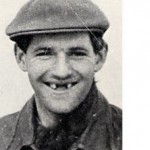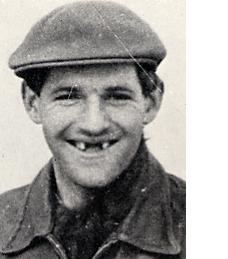THINGS LONG AGO
Once on Romney Marsh not so long ago, it was a very unhealthy place to live. There was a dreaded thing that was called the Ague, a disease we now know was a type of malaria, caused by the mosquito which lived in the water that covered a lot of the flat land. The local remedy for the Ague was said to be to swallow a spider, whole, wrapped up in its own web. The sheer thought of doing so must have made many people suddenly recover from the illness rather than take the cure!

Things that have changed in my lifetime are more to everyone’s liking, I hope. Such as where have all the old men with their sandwich boards gone? You never see one even on the seafront where they used to thrive. Ice cream parlours are another thing that have vanished from our streets. The other year my big brother and I took a train from Rye to Hastings on a nostalgia trip. The highlight was to be a knickerbocker glory ice cream. Alas, even in that fine seaside town, no one knew of such a place and we had to settle for a cornet of instant cream on the sea front! Hardly the thing we had been looking forward to!
When I was a lad and helped my father lamb the sheep, it was my job to gather up all the afterbirth from the field. This he sold to a doctor and it was made into medicine for pregnant women. Now chemicals have replaced it the woman reader will be pleased to know!
An awful lot of the garages in England have closed and now vans run around the countryside all hours of the day delivering spare parts as they are ordered. There was little of that in my young day. Our local garage standing on the corner alongside the A259 used to get their spare parts delivered within the hour. An account was set up with the main distributor and from then on, a simple phone call was all that was required. The next bus from town would pull up and your spare part would slide across the forecourt as the conductor lobbed it out. Now even the conductor has gone.
I sometimes wonder where the humans are going. Only the other year I had to go to Ashford to buy some bee frames from a fellow who worked at the rail station. He was a keeper of bees and in his home ran the local Society’s depot. This house stood on a nasty corner and it was unsafe to park. I bought over one hundred pounds worth of gear and with his wife in the road warning the oncoming traffic, swiftly loaded the items in my car and drove home. It was an hour later while unloading that I realised a certain item that was critical to the frames was missing, so I phoned him up to catch him just as he was going to work. Yes he had found the small box that weighed one kilo. It was on his kitchen table as I drove
away. The small box of grip pins was in his view as he spoke to me. I asked him if it was possible to take them to work and put them on the next train to Rye as he was going to work on the platform that night. He was sorry; the only way nowadays to send parcels by rail was to send them by Red Star and that meant them going all the way from Ashford to London then back down via Hastings as that was the nearest station to do the service. I could not believe my ears! Once the guard off loaded any parcel at its nearest destination. Now sadly, that too has died.
Those railway days of glue in a pot with a wooden handled paste brush and most men wearing a hat of some description are long gone.
QUEEN FOR THE DAY
Rye Bonfire Boys get involved in many things, not all dangerous we hoped, like letting off huge fireworks. Today was such an occasion. The society were to help with the running of the Miss Rye Beauty Queen Contest and why not? It was Rye and we were all young and energetic in those days.
The day had gone well and Martin, one of the members had elected to take the young girl home. At the time she was still dressed in her queens gown and wearing a tiara borrowed from a firm in Hastings and it had been emphasised on us that it in no way was it to be damaged or in any way misused and to be guarded with your life! All felt that it was safe on the pretty six foot blondes head, all precautions were taken to keep her and the jewels safe but that did not stop the results to follow. It was firmly on her head and was quite safe when she departed with Martin.
Martin at the time had a red open top two-seater sports car. They left Rye in the late evening of a warm sunny day to journey four miles to the girl’s home. Martin was a good driver and you would have thought nothing could happen to her or him or the priceless headgear.
After years of courting danger letting those massive fireworks off he was now driving a very pretty girl home. Anyone who knew Martin would have put money on the girl being the one having to look out for trouble such a good looking girl seldom got in his car so keenly. The girl’s home lay out in the country down a lane used by travellers for centuries and had been worn down below the fields bordering it. The narrow lane had a hedge each side and now as they slowly negotiated the twisting road.
All corners were taken in fine style; it was not the corners but the narrow straight where it happened, the sky suddenly with out warning fell upon them, or to be precise a large brown horse, as it jumped the hedge for some unknown reason.
At the speed they were going, and Martin later said it was no more than a crawl as he was enjoying the company and getting somewhere in asking her out on a date, that the bloody horse came flying over the hedge to land on top of them. The resulting crash wrote the car off and killed the horse.
Martin took over ten minutes running down the lane to get help for the poor girl trapped and covered in blood from the bleeding half ton dead horse on top of her.
The police fire brigade and ambulance attended and she was recovered unhurt, not so her lovely dress torn and covered in the animal’s blood. All this occurred on a lovely summer’s day in broad daylight in a lonely country lane, and no fault of either of them. The sting came a day later when no one knew of the whereabouts of the Beauty Queen’s crown!
YESTERDAY
Who remembers the time when your milk was delivered to your doorstep; the empty clean bottles taken away each morning before you rose from your bed? The times the blue tits beat you to the top of the milk or the frost froze the contents so much that rather than break the bottle the icy milk towered like a candle from the top. Ice formed inside your bedroom window and the house smelt of burning paraffin from the stove that struggled to keep the chill off the air. The baker called three times a week with new bread and the milkman called Saturday mornings for the money. Now alas, frightened to because of someone around the corner who may mug him for the weekly takings.
Remember the postman coming twice a day and the workman pushing the hand carts around the town as they went from job to job. No vans then parked outside the house all day. Craftsman were at work, each to his trade, now a builder does the lot; plumbing, plastering, bricklaying, pointing. One big ugly van and two or three chaps. A radio blasts out its noise. Mobile phones are a necessity in the trade, before, a piece of paper from the foreman told you what to do and when. Men whistled the latest tune for songs of the day had a tune not as today, a beat, thump, thump. When did you last hear anyone whistle as they worked? The art seems to have got lost.
A shop owner/keeper standing outside greeting customers like Mr Horner did in his apron and straw hat. Come to think of it, when did you last see anyone welcoming customers? Now it’s all ‘help yourself’. One of the few shops to serve you with everything are the butchers and they are fewer and fewer nowadays. Although pubs still serve their customers, but even there you can purchase things from machines.
No-one now uses a scythe or swop. It’s always a strimmer or mechanical cutter in place of a scythe. Hedges are cut with a machine, never with a billhook or laid to get a proper hedge. Now to get a man to lay a good hedge you have to search the Yellow pages. Once a man to work your line of trees and bushes was known of and obtained from the local pub as some farm hand dropped in for a drink on going home. There are still a few around but they are as scarce as scarecrows in the fields. Their jobs have been taken over by mechanical things.
Ask a young twenty year old girl if she can knit or darn and the betting is that she won’t know what darning is. Any pair of socks with a toe hole is thrown out for a new pair. Once any girl who could not darn or sew was a poor little creature. Girls could knit, sew, darn and cook as well as wash without a machine. Boys could dig a garden and know what type of seed they were planting by the look or smell of it. I know one lad who thought it was a silly place to keep my potatoes when I went to dig a root up. He really thought they came from a greengrocer and that was only a few years ago!
Who remembers going to bed with a house brick? I do. Warmed in front of the open fire and wrapped in flannel, it took the beastly chill from the cotton sheets, now nearly all nylon. And later when cold, if still awake, they made a hell of a noise as one jettisoned them with your feet out of bed to land on the floor!
When school was the place to listen and learn, not talk. Miss or Sir were the only names all our teachers had. Playtime or answering a question was the only time you were allowed to make a noise. The only name you had was your surname. You respected and feared your teachers, while at the same time liked them. The cane punished those who overstepped the mark as the slipper did the girls. Short hair for boys. Girls could grow theirs if they wished but no make up; that was a thing to come. Boys wore scarves and gloves, no macho image for us. Why? Did not the troops have scarves? Who had not seen a picture of a pilot flying his plane with a scarf flapping in the breeze. Now I am romancing! Good night, God bless!
Jimper
“Hastings Town” May 2008
All articles, photographs and drawings on this web site are World Copyright Protected. No reproduction for publication without prior arrangement.
